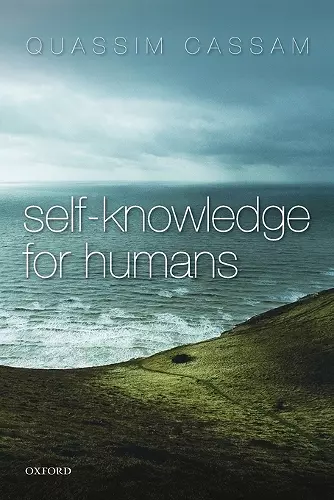Self-Knowledge for Humans
Format:Paperback
Publisher:Oxford University Press
Published:3rd Nov '16
Currently unavailable, and unfortunately no date known when it will be back
This paperback is available in another edition too:
- Hardback£62.00(9780199657575)

Human beings are not model epistemic citizens. Our reasoning can be careless and uncritical, and our beliefs, desires, and other attitudes aren't always as they ought rationally to be. Our beliefs can be eccentric, our desires irrational and our hopes hopelessly unrealistic. Our attitudes are influenced by a wide range of non-epistemic or non-rational factors, including our character, our emotions, and powerful unconscious biases. Yet we are rarely conscious of such influences. Self-ignorance is not something to which human beings are immune. In this book Quassim Cassam develops an account of self-knowledge which tries to do justice to these and other respects in which humans aren't model epistemic citizens. He rejects rationalist and other mainstream philosophical accounts of self-knowledge on the grounds that, in more than one sense, they aren't accounts of self-knowledge for humans. Instead he defends the view that inferences from behavioural and psychological evidence are a basic source of human self-knowledge. On this account, self-knowledge is a genuine cognitive achievement and self-ignorance is almost always on the cards. As well as explaining knowledge of our own states of mind, Cassam also accounts for what he calls 'substantial' self-knowledge, including knowledge of our values, emotions, and character. He criticizes philosophical accounts of self-knowledge for neglecting substantial self-knowledge, and concludes with a discussion of the value of self-knowledge. This book tries to do for philosophy what behavioural economics tries to do for economics. Just as behavioural economics is the economics of ^homo sapiens, as distinct from the economics of an ideally rational and self homo economics, so Cassam argues that philosophy should focus on the human predicament rather than on the reasoning and self-knowledge of an idealized homo philosophicus.
I highly recommend Cassam's book. It provides a deep, yet admirably accessible study of self-knowledge and surrounding issues, and is full of helpful and often surprising insights. * Michael Roche, Mississippi State University, The Philosophical Quarterly *
ISBN: 9780198776680
Dimensions: 235mm x 158mm x 14mm
Weight: 396g
256 pages